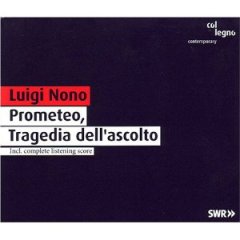Luigi Nono - Prometeo - Tragedia dell'ascolto (2007)
Luigi Nono - Prometeo - Tragedia dell'ascolto (2007)

CD1
1. No. 1. Prologo
2. No. 2. Isola No. 1
3. No. 3. Isola No. 2 / No. 3a.
4. No. 3b. Hölderlin play
CD2
1. No. 3c. Stasimo No. 1
2. No. 4. Interludio No. 1 play
3. No. 5. Tre Voci a
4. No. 6. Isola No. 3 - No. 4 -
5. No. 7. Tre Voci b
6. No. 8. Interludio No. 2
7. No. 9. Stasimo No. 2
Performer:
Ensemble Recherche,
SWR Baden-Baden and Freiburg Symphony Orchestra,
Solistenensemble des Philharmonischen Orchesters Freiburg,
Monika Bair-Ivenz, Petra Hoffmann, et al.
Conductor: Kwame Ryan, Peter Hirsch
Luigi Nono was a composer heavily influenced musically by early modern period composers, especially 12-tone/atonal composers such as Schoenberg, and influenced philosophically (principally) by Marxism. Luigi Nono had come into his own by the 80s, however, and this work can easily be considered a triumph of opera in the 20th century, both in content and in music, and the culmination of Nono's career. Enjoy.
Both the composition and the recording of this "tragedy of listening" took some years to complete. Luigi Nono kept rewriting large parts before and after the 1984 premiere and worked extensively with many of the people that participated on this recording and surround mix of Prometeo. It is based largely on a text by Massimo Cacciari that concerns the basics of human culture and consequently contains a lot of quotes from ancient Greek mythology, like those concerning Prometeo, a pivotal figure in freeing humans from the Gods and sparking off their culture.
The music is generally very quiet and austere, long airy phrases on the instruments occasionally mixed with parts of the texts, with most syllables lasting several moments. Sometimes the music accompanies words that are supposed to be just present in the minds of the performers. Here and elsewhere the fine listening score really helps out to make sense of the large array of personae taking part, singing texts in multiple languages. The music has a kind of slow glacial beauty to it but it all sounds very distant so it takes some effort to figure out its dynamics and form which, considering the large number of performers involved, is actually quite uncomplicated.
In all Prometeo is a rather abstruse piece far removed from any daily concerns (which can be a good thing of course), finally the impression one might get is that of a bunch of mad monks wandering around their monastery at the end of times being engaged in unimaginable pursuits. –Ivar de Vries
download: uploaded yandex 4shared mediafire solidfiles mega filecloudio nornar ziddu
Last Updated (Tuesday, 04 March 2014 11:14)








